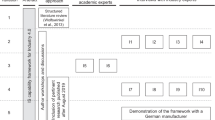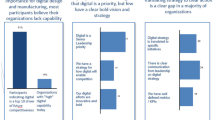Abstract
Industrial production systems are facing radical change in multiple dimensions. This change is caused by technological developments and the digital transformation of production, as well as the call for political and social change to facilitate a transformation toward sustainability. These changes affect both the capabilities of production systems and companies and the design of higher education and educational programs. Given the high uncertainty in the likelihood of occurrence and the technical, economic, and societal impacts of these concepts, we conducted a technology foresight study, in the form of a real-time Delphi analysis, to derive reliable future scenarios featuring the next generation of manufacturing systems. This chapter presents the capabilities dimension and describes each projection in detail, offering current case study examples and discussing related research, as well as implications for policy makers and firms. Specifically, we discuss the benefits of capturing expert knowledge and making it accessible to newcomers, especially in highly specialized industries. The experts argue that in order to cope with the challenges and circumstances of today’s world, students must already during their education at university learn how to work with AI and other technologies. This means that study programs must change and that universities must adapt their structural aspects to meet the needs of the students.
[Abstract generated by machine intelligence with GPT-3. No human intelligence applied.]
Access this chapter
Tax calculation will be finalised at checkout
Purchases are for personal use only
Similar content being viewed by others
References
Bauernhansl, T., Hartleif, S., & Felix, T. (2018). The digital shadow of production—A concept for the effective and efficient information supply in dynamic industrial environments. Procedia CIRP, 72, 69–74.
Bergs, T., Brecher, C., Schmitt, R., & Schuh, G. (2021). Internet of production—Turning data into sustainability. In Proceedings Aachener Werkzeugmaschinen-Kolloquium (AWK) 2021 (p. 466). Apprimus Verlag.
Brundtland, G. (1987). Our common future. Report of the World Commission on Environment and Development. United Nations.
Dankert, L. S., Gilmartin, S. K., Muller, C. B., Dungs, C., Sheppard, S. D., & Leicht-Scholten, C. (2019). Expanding engineering limits: A concept for socially responsible education of engineers. The International Journal of Engineering Education, 35(2), 658–673.
Dellermann, D., Ebel, P., Söllner, M., & Leimeister, J. M. (2019). Hybrid intelligence. Business & Information Systems Engineering, 61(5), 637–643. https://doi.org/10.1007/s12599-019-00595-2
Downey, G. L., Lucena, J. C., Moskal, B. M., Parkhurst, R., Bigley, T., Hays, C., … Nichols-Belo, A. (2006). The globally competent engineer: Working effectively with people who define problems differently. Journal of Engineering Education, 95(2), 107–122.
European Commission (2019). The European Green Deal. Communication from the commission to the European Parliament, the European Council, the council, the European Economic and Social Committee and the committee of the regions. https://www.eea.europa.eu/policy-documents/com-2019-640-final
European Commission (2021). Horizon Europe, the EU research and innovation programme (2021–27): For a green, healthy, digital and inclusive Europe. https://op.europa.eu/en/publication-detail/-/publication/93de16a0-821d-11eb-9ac9-01aa75ed71a1
Feng, S. C., Bernstein, W. Z., Hedberg, T., & Barnard Feeney, A. (2017). Toward knowledge management for smart manufacturing. Journal of Computing and Information Science in Engineering, 17(3), 031016.
Gawer, A. (2014). Bridging differing perspectives on technological platforms: Toward an integrative framework. Research Policy, 43(7), 1239–1249.
Leicht-Scholten, C., Steuer, L., & Bouffier, A. (2016). Facing future challenges: building engineers for tomorrow. In New Perspectives in Science Education Conference Proceedings (pp. 32–37).
Leicht-Scholten, C., & Steuer-Dankert, L. (2020). Educating engineers for socially responsible solutions through design thinking. In Design thinking in higher education (pp. 229–246). Springer.
Nonaka, I., & Takeuchi, H. (2007). The knowledge-creating company. Harvard Business Review, 85(7/8), 162.
Pennekamp, J., Alder, F., Matzutt, R., Mühlberg, J. T., Piessens, F., & Wehrle, K. (2020). Secure end-to-end sensing in supply chains. In 2020 IEEE Conference on Communications and Network Security (CNS) (pp. 1–6).
Schemmer, T., Brauner, P., Schaar, A. K., Ziefle, M., & Brillowski, F. (2020). User-centred design of a process-recommender system for fibre-reinforced polymer production. In Human interface and the management of information, HCII 2020 (pp. 111–127). Springer. https://doi.org/10.1007/978-3-030-50017-7
Schemmer, T., Reinhard, J., Brauner, P., & Ziefle, M. (2022). Advantages and challenges of extracting process knowledge through serious games. In Proceedings GamiFIN Conference 2022. http://ceur-ws.org/Vol-3147/paper2.pdf
Stark, R., & Damerau, T. (2019). Digital twin. In S. Chatt & T. Tolio (Eds.), CIRP encyclopedia of production engineering (2nd ed.). Springer.
Tambe, P., Cappelli, P., & Yakubovich, V. (2019). Artificial intelligence in human resources management: Challenges and a path forward. California Management Review, 61(4), 15–42.
Zenkert, J., Weber, C., Dornhöfer, M., Abu-Rasheed, H., & Fathi, M. (2021). Knowledge integration in smart factories. Encyclopedia, 1(3), 792–811.
Acknowledgment
Funded by the Deutsche Forschungsgemeinschaft (DFG, German Research Foundation) under Germany’s Excellence Strategy – EXC-2023 Internet of Production – 390621612.
Author information
Authors and Affiliations
Corresponding author
Editor information
Editors and Affiliations
Rights and permissions
Copyright information
© 2022 The Author(s), under exclusive license to Springer Nature Switzerland AG
About this chapter
Cite this chapter
Hinke, C. et al. (2022). Capability Configuration in Next Generation Manufacturing. In: Piller, F.T., Nitsch, V., Lüttgens, D., Mertens, A., Pütz, S., Van Dyck, M. (eds) Forecasting Next Generation Manufacturing. Contributions to Management Science. Springer, Cham. https://doi.org/10.1007/978-3-031-07734-0_6
Download citation
DOI: https://doi.org/10.1007/978-3-031-07734-0_6
Published:
Publisher Name: Springer, Cham
Print ISBN: 978-3-031-07733-3
Online ISBN: 978-3-031-07734-0
eBook Packages: Business and ManagementBusiness and Management (R0)




